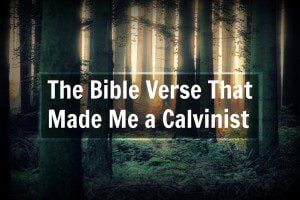 Marker Moments are what I call instances in our lives that are so identifiable that we often divide time with them. I’m sure you can think of several pretty quickly. The easy ones are when you get married, graduate college, and so on.
Marker Moments are what I call instances in our lives that are so identifiable that we often divide time with them. I’m sure you can think of several pretty quickly. The easy ones are when you get married, graduate college, and so on.
The funny thing is that with some marker moments we don’t realize their significance until several years later. This was the case for me when I began to ponder a particular verse in Acts 13. I didn’t realize the influence it would have not only on my theology, but my entire life.
I came across this verse after having been recently confronted with calvinistic theology and reformed thought. At the time, I was a new Christian and very oppose to calvinistic doctrines, as many are. They can seem abrasive because they cut right at the heart of who we are, how we view God and how we view the world.
Still, we can’t deny that words like “predestination” and “elect” are not in the bible. Because they are. The question is, how do we manage them? How do we fit them into a systematic thought that helps understand the bible in its whole context?
If we profess to hold a high view of scripture, meaning that scripture is indeed the inspired word of God, then its clear we have to do something with them. We can’t pretend they don’t exist. God has given us His word so that it is “profitable” (2 Timothy 3:16) for believers. There is value in knowing how to understand election and predestination in the bible.
For some, they take what I will call traditionally “calvinistic verses” and have a “hands-off” approach; they lump them in the same category of other mysteries of the bible and move on. For others, they view them not directed towards individuals but groups of people, such as the church as whole. Or maybe, they find ways to change the meaning of the word “predestined” to have a meaning more akin to “foreknowledge”.
There are all kinds of different interpretations and understandings of soteriology (the doctrine of salvation) and the point of this article is not to provide an exhaustive critique of each one. Rather, the point is draw attention to the verse that, for me, shattered non-calvinistic interpretations of those verses in the bible.
It should be worth adding that it was not just this one verse that ultimately convinced me of reformed soteriology. But, a collective coherent thought and progression of how God has always delt with His people throughout all bible. Still, Acts 13:48 was monumental in this process.
When I first came across this section of scripture, I read it, re-read, and re-re-read. I encourage you do the same. In fact, read the entire chapter – its a fantastic narrative. I have provided a few extra verses for immediate context. Note that Paul and Barnabas are preaching at Antioch.
The next Sabbath almost the whole city gathered to hear the word of the Lord. But when the Jews saw the crowds, they were filled with jealousy and began to contradict what was spoken by Paul, reviling him. And Paul and Barnabas spoke out boldly, saying, “It was necessary that the word of God be spoken first to you. Since you thrust it aside and judge yourselves unworthy of eternal life, behold, we are turning to the Gentiles. For so the Lord has commanded us, saying,
“‘I have made you a light for the Gentiles,
that you may bring salvation to the ends of the earth.’”And when the Gentiles heard this, they began rejoicing and glorifying the word of the Lord, and as many as were appointed to eternal life believed. And the word of the Lord was spreading throughout the whole region. But the Jews incited the devout women of high standing and the leading men of the city, stirred up persecution against Paul and Barnabas, and drove them out of their district. But they shook off the dust from their feet against them and went to Iconium. And the disciples were filled with joy and with the Holy Spirit. (Acts 13:44-52, emphasis added, ESV)
There it was, a marker moment. I think what’s still so compelling to me in this verse is that its not a broad doctrinal statement on God choosing a general people for him self. Nor is it a long drawn out theological treatise with difficult “if, then” statements. But rather, this is a very historical and contextual example of election taking place in the bible. It’s a succinct statement, from Luke, about how God saved gentiles who heard the sermon.
Not to mention, it says it so plainly and straight-forward. Those that were “appointed to eternal life believed”. We can infer from this text that there were also some people present who were not appointed and also did not believe, such as the Jews in the this text. Luke doesn’t make excuses or qualify what he says. Rather he explains how and what happened and moves on.
As I read this for the first time, I quickly grabbed other translations and tried to see if it was something about the version I was using. I saw words like “ordained, “destined” and “chosen.” I couldn’t get around it. I set my pen down and began to pray for right understanding. It wasn’t much longer that I decided I was “reformed”. It still took some time for me to adopt the term “calvinist”, after all, I didn’t want people thinking I worship John Calvin!
But even that, over time, became less of an issue. Calvin was not the originator of these ideas, he was just the person in Church history God used to help the church rediscover these beautiful truths.
I can now agree with Charles Spurgeon who once said, “It is no novelty, then, that I am preaching; no new doctrine. I love to proclaim these strong old doctrines that are called by nickname Calvinism, but which are truly and verily the revealed truth of God as it is in Christ Jesus. By this truth I make my pilgrimage into the past, and as I go, I see father after father, confessor after confessor, martyr after martyr, standing up to shake hands with me . . . Taking these things to be the standard of my faith, I see the land of the ancients peopled with my brethren; I behold multitudes who confess the same as I do, and acknowledge that this is the religion of God’s own church.” (Spurgeon’s Sovereign Grace Sermons, Still Waters Revival Books, p. 170)
I think back now and realize how profound of a moment that was for me. My heart and mind were captivated by the word of God and changed. God opened my heart to understand the scriptures and it was only after this moment that the bible really began to make sense to me. Previously, I would read sections of scripture and be largely confused on what was happening. But, with a general understanding of God’s sovereignty, the pieces fit together beautifully. The bible finally made sense and communicated a common thread of hope all the way through it – namely, “I will be your God and you will be my people.”
There are certainly mysteries in scripture and areas that I’m sure not all of my theology is right. But, one thing I have learned is to lean on the grace of God for forgiveness and right understanding. I thank God that there was a moment in time when He appointed me for salvation. Because if He had not chosen me, I would have never come.
Original Photo Attribution: “Belgium” By Willy Verhulst; CC 2.0













